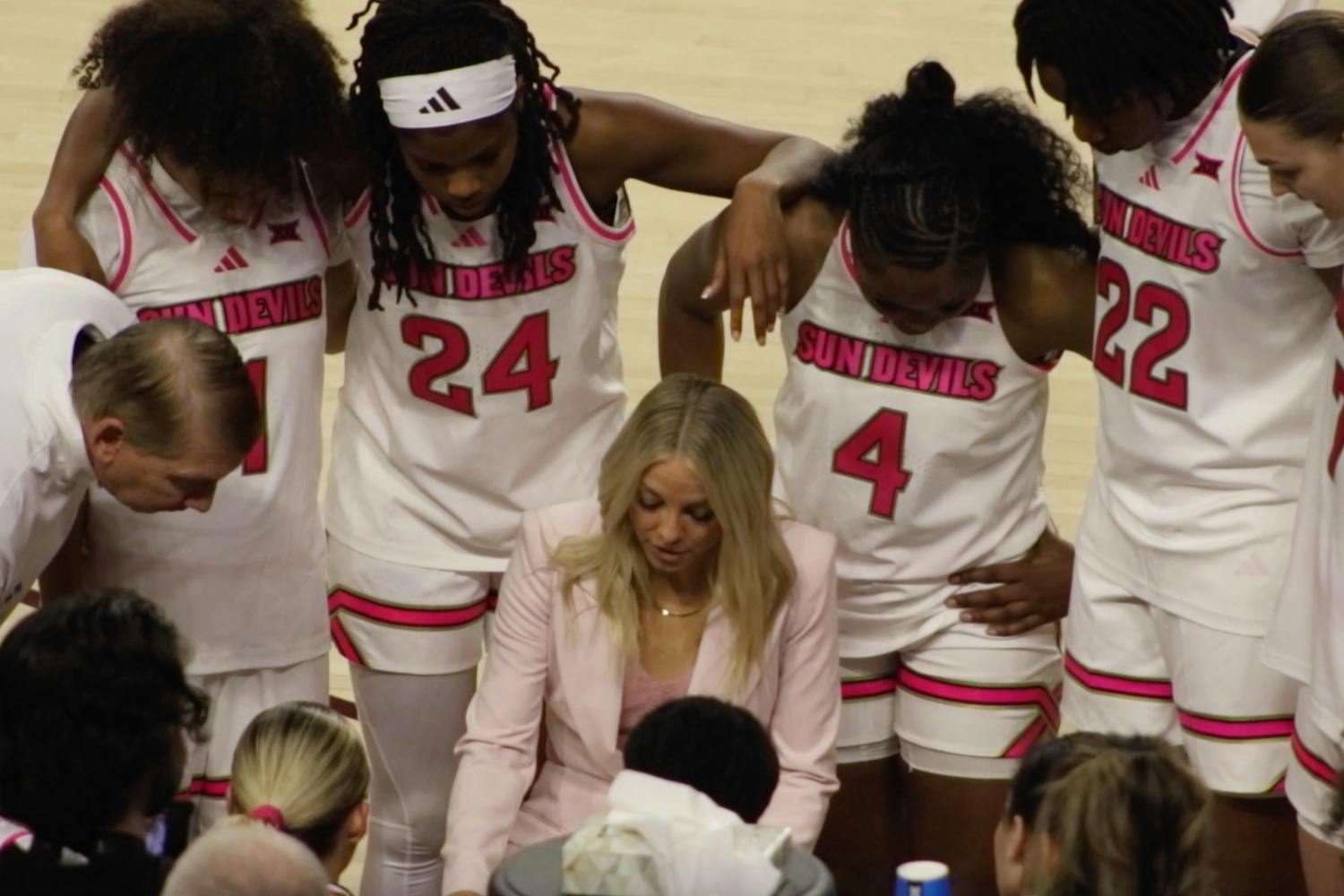Tempe Undergraduate Student Government President Isaac Miller has neither a frame nor character that scream power. He's a tall, lanky man earning a philosophy degree who says he values exact and understanding communication.
He smiles frequently and sang along when a group of bicyclists burst through the center of campus belting a rendition of the 1988 Proclaimers classic "I'm Gonna Be (500 Miles)." Frequently, passers-by approach him to shake his hand and thank him for speaking with them.
And, as Tempe USG president, he is the leader of one of the largest student bodies in the nation. As a senior, his time with Tempe USG will be over soon. He sat down with the State Press to reflect about his background, his presidency and the future.
Here are some highlights:
Listen to the whole interview, complete with the occasional interruption and a call from Miller's dad, below:
How did you get involved in (Tempe) USG?
The beginning of my college career, as a freshman, I had no interest in really anything political. Student government seemed nice, but it didn't really seem for me. I took some general studies classes — some economics, an immigration class and a social and political philosophy class and it totally made me rethink what I was interested in pursuing. I interned in the district office for a member of Congress, and it was a cool experience, so I thought, "Oh, what the heck, I'll give this USG thing a try."
So (as a junior), I ran to be a senator, and didn't really know if I'd get it, and I got it. I bought in, and really worked hard as a senator and a lot of doors opened up to run with (Marissa Fullford, vice president of Services) and (Karis Felthouse, vice president of policy), who ended up being perfect counterparts for me, and also to get to work very closely with my other two fellow execs and the other senators.
Has your (philosophy) major influenced your time in USG?
Yeah, I think so. Often, when there's a source of debate, I usually just end up wanting to clarify things. Because of how meticulous phrasing in philosophy has to be, I find that a lot of problems get solved when you're clear when you present your claims and your viewpoints. I've gotten to bring that into USG a lot, and I think that it's also influenced the way I interact with the senators and my fellow execs and also with my counterpoints on the other campuses.
What makes an ideal presidential candidate?
I would say that an ideal presidential candidate should really be an ideal person who is interested in a student leadership position. For me what I find ideal in leadership in general is humility — I think humility is huge and is so essential for solid leadership. I think also familiarity with the thing that you're leading is great. I also know that a decent amount of support for one potential candidate (in the upcoming USG elections) or another would come not just from me but from my entire team of executives.
What are some of the most important policy points and goals for your administration in the upcoming semester?
We have a lot of good things going on. (Feb. 25), we have a lobbying day that we're trying to make as statewide as possible. In our senate, we have just passed or are looking to pass different resolutions looking to support legislative initiatives at the state legislature, one of which is the new Arizona Board of Regents resident-based funding model, which we find has gained at least some support from the state legislature and the governor.
We also passed a resolution supporting responsible reporting, and then also a resolution supporting the allowance of student identification to serve as a valid form of (polling location identification) to break down every possible wall for students to vote. Probably our biggest priority is securing funding for our public universities, especially in light of last year's budget cuts.
How do you feel, personally and as USG Tempe president, about the new budget?
I'd say I think the University administration pretty accurately reflected what I think about that. I think it's a good start, I like the fact that (Gov. Ducey) was moving to restore some of the cuts, but obviously I'd like more on behalf of our students, and I'll be glad to fight for more.
I respect the governor's other initiatives, but I think that we could certainly afford to give our state's universities a lot more support. I keep on hearing stories of in-state students with a lot of talent who are getting full rides to out-of-state universities.
Our (Feb. 25) lobbying day is when we want to bring a lot of students and come out in numbers to show the state legislature how much we care about receiving their support and how much of a benefit we bring to the state.
There are lots of new initiatives and resources at the University that are also driving up costs. How do we afford college?
One thing that's very intriguing to me is that, in the early- or mid-2000s, tuition substantially increased. And interestingly enough, one of the reasons why it jumped up a lot is to make sure that disadvantaged people could come to college. That extra money (from students who could afford to pay more) could be used to subsidize the education and provide for scholarships for the education of the disadvantaged students.
Moving forward with tuition, it's a hard question to answer because it's dependent on so many different parties. It's dependent on University administrators, who get blamed for tuition hikes by the legislators. It's dependent on alumni donations. It's dependent on support from the legislature.
There are some people who may not be inclined to support public universities with public funds. There are players like that who make this whole system very volatile. I do know that ABOR is trying to work toward a goal with the state of making 50 percent of tuition for in-state students completely subsidized. The more support we get for residents, the less out-of-state domestic students and international students have to subsidize resident tuition. I'm optimistic about whether or not ABOR will be able to work toward that 50 percent.
How do you think we help the group in the middle who lack the resources to pay for college but also have their tuition raised to subsidize underprivileged students?
One thing I would imagine is, ideally we could increase merit based scholarships. That's one thing I'd like to see. That would not preclude someone over a certain household income from applying. I think that's something very much worth looking into. I know one thing that the University has been working toward is a state-based financial aid program. Other states have it, we don't. We have FAFSA or Pell grants at the federal level, so it'd be something similar to that at the state level.
What is an average day like for the Tempe USG president?
My life is on Google Calendar. It's advice I got from my predecessor. My Wednesdays are my most USG-intensive days. At 9 a.m. I have my staff meeting. From 10 a.m. to noon, I have a meeting with the council of presidents, with my counterparts from the other campuses. At noon, from noon to 1 p.m. — I have no concept of when I eat lunch — I have a meeting to give some more student input on behalf of our organization into the construction of the new student pavilion.
At 12:30 we usually have executive meetings on Wednesdays where I meet with my fellow execs from USG Tempe. At around 3:30 I have my weekly one-on-one with my chief of staff. And then, I also have homework. I need to read for my philosophy of mind class, for my morality of politics class and I also have to prepare for my stand-up comedy class.
It's a blast.
Where are you going after ASU?
I'm planning on going to law school — I'm taking the LSAT in June — but I'm planning on taking a gap year, and I have no idea what I'm doing in that gap year. This is pretty cool, cause it seems that the purpose I'm gonna get to serve next year is something better than what I imagine from myself, which is kinda humbling but pretty exciting.
And I just want to throw in one more thing.
Yeah? Go ahead.
The athletics fee is under review this semester.
Correction: Due to a source error, a previous version of this article incorrectly stated details of a resolution Tempe USG is supporting. This version has been updated with the correct information.
Related Links:
10-foot menorah to be lit for Hanukkah by USG President Isaac Miller
New Tempe Undergraduate Student Government President talks about University issues
Reach the reporter at Arren.Kimbel-Sannit@asu.edu or follow @akimbelsannit on Twitter.
Like The State Press on Facebook and follow @statepress on Twitter.




